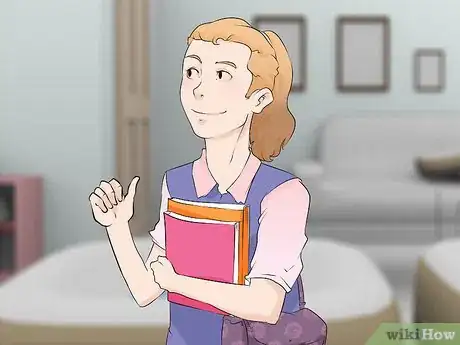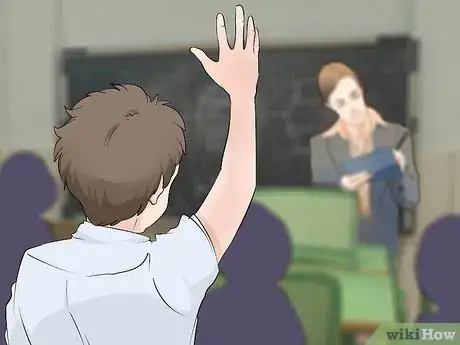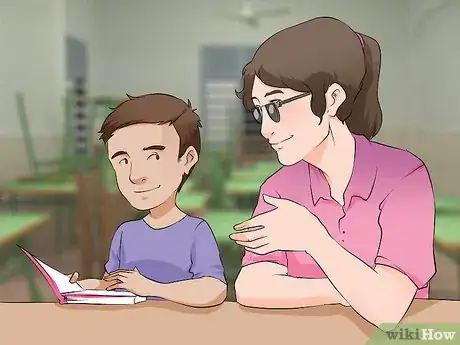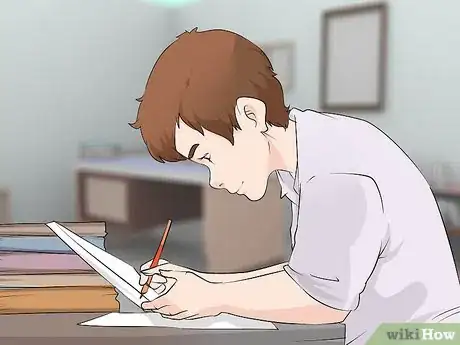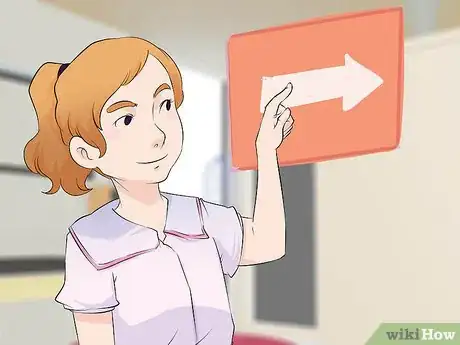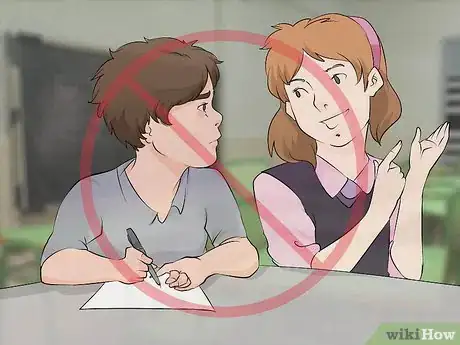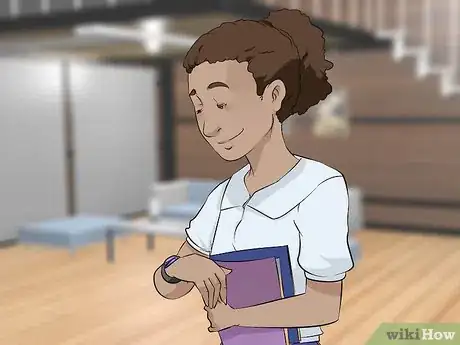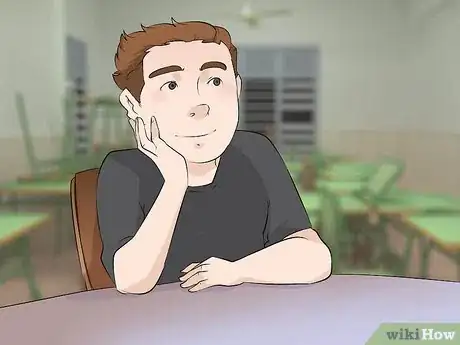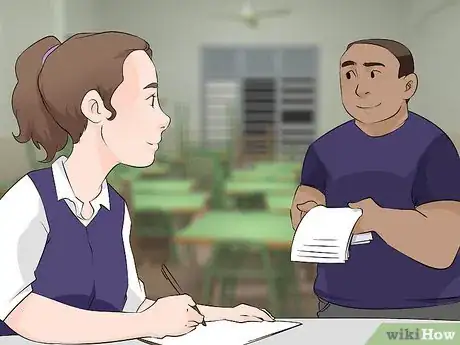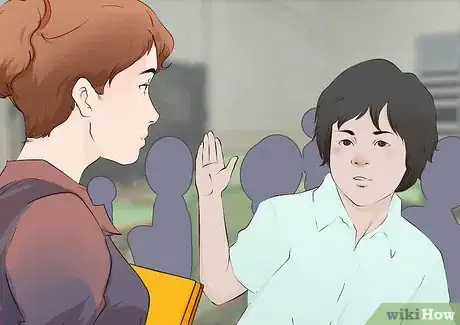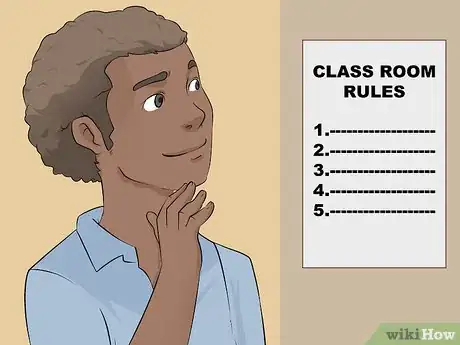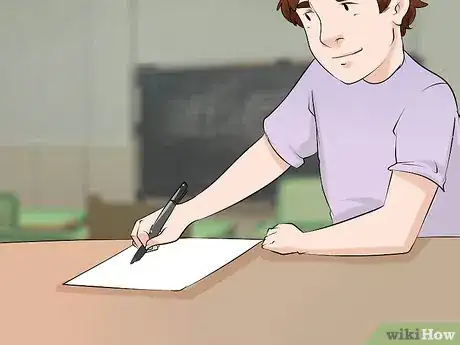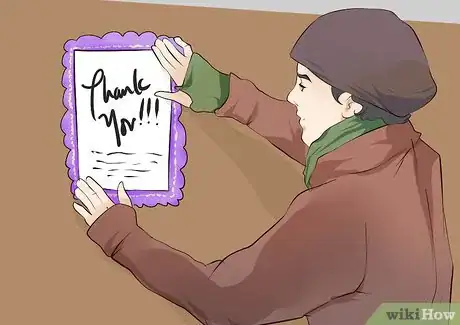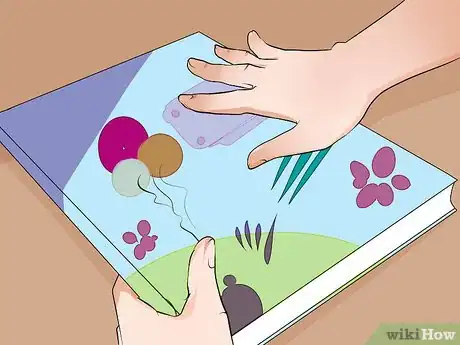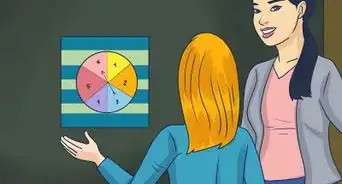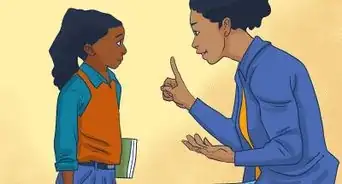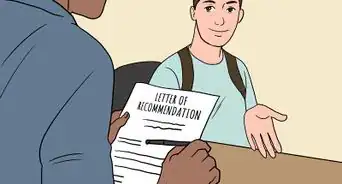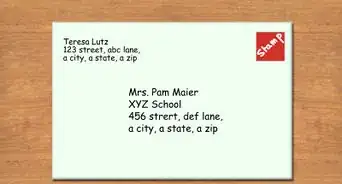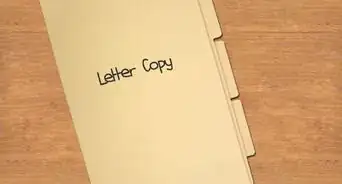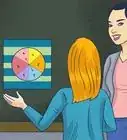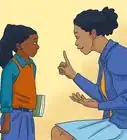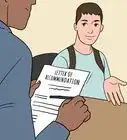This article was co-authored by Alicia Oglesby and by wikiHow staff writer, Amber Crain. Alicia Oglesby is a Professional School Counselor and the Director of School and College Counseling at Bishop McNamara High School outside of Washington DC. With over ten years of experience in counseling, Alicia specializes in academic advising, social-emotional skills, and career counseling. Alicia holds a BS in Psychology from Howard University and a Master’s in Clinical Counseling and Applied Psychology from Chestnut Hill College. She also studied Race and Mental Health at Virginia Tech. Alicia holds Professional School Counseling Certifications in both Washington DC and Pennsylvania. She has created a college counseling program in its entirety and developed five programs focused on application workshops, parent information workshops, essay writing collaborative, peer-reviewed application activities, and financial aid literacy events.
There are 8 references cited in this article, which can be found at the bottom of the page.
wikiHow marks an article as reader-approved once it receives enough positive feedback. In this case, several readers have written to tell us that this article was helpful to them, earning it our reader-approved status.
This article has been viewed 89,620 times.
Sometimes it’s hard to know how to act around a teacher, especially at the beginning of the year when you’ve only just met them. However, there is one thing you should always do around your teacher – be nice to them. Luckily, there are lots of easy ways to do that! Being nice to your teacher is the first step toward developing a positive relationship with them.
Steps
Trying Your Best in School
-
1Be prepared. Try to be prepared for every lesson so that you can follow along easily. Make sure you have the right supplies, books and completed assignments for each lesson. When you go into class, be ready to learn. When you're doing your homework the night before, write down any questions you have about it.
- Make sure to ask your teacher those questions the next day.
- This will show your teacher that learning is important to you.[1]
-
2Participate in lessons. Try not to drift off or get distracted. If the teacher asks the class a question and you know the answer, raise your hand. Get involved in group discussions whenever you can. When you do join in, never talk over a classmate or interrupt your teacher. If you aren’t sure how to join a class discussion, ask a question.[2] [3]
- You could say something like, “Mrs. Bell, can we talk more about the main character’s motivations in the book?”[4]
- You could also say something like, “Mr. Turner, can we please go through that equation one more time? I’m not sure I understand the last part of it.”
Advertisement -
3Work on your assignments when instructed. When the teacher gives in-class assignments, always do them when you’re supposed to.[5] Work during the work period provided so that you can finish your assignments on time. Try not to distract anyone nearby who’s also working on their assignments.
-
4Do your homework. Always doing your homework is a way to show your teacher that you care about the class and what you're learning. Teachers work long hours teaching kids all day, so when students don’t do their homework or complete assignments, they feel ignored. Teachers, like everyone, want to feel that what they do matters. When students show that they are learning things, it makes their teachers happy. [8]
- Doing your homework is one of the easiest ways to be nice to your teacher!
- If you’ve been out sick and missed class, always ask your teacher what you missed. Be sure to get your makeup assignments and homework.
-
5Follow directions.[9] Whenever the teacher asks you to do something specific, be sure to follow their directions exactly. Do your assignments the way the teacher told you to. Whenever your teacher verbally asks you to do something, always do it without making a fuss.
- Never do anything disrespectful, like make a face or roll your eyes, when the teacher asks you to do something.
- If you don’t understand the directions given, don’t be afraid to raise your hand and ask a question or for assistance.
-
6Avoid distracting other students. Never make excessive noise or talk to your classmates during a lesson. Don't shuffle papers around loudly, dig noisily in your back pack or slam books around. This will interrupt your classmates’ concentration and your teacher. If you can’t pay attention when you sit by your friends, try sitting elsewhere. You can save small talk with your friends for after class.
- If you have assigned seats, go to your teacher privately after class and ask to be moved.
- Let them know you'd like to be moved so that you can concentrate on lessons better. Your teacher will appreciate that you are taking an active role in your education.
Showing Respect for Your Teachers
-
1Be on time. [10] Teachers expect you to be on time to class. Everyone is late occasionally, but making a habit of being late will definitely upset your teacher. It makes them feel like you don’t care about the class and don’t respect their time. On the occasions when you are late, apologize to your teacher sincerely and come into class as quietly as possible.
- Don’t interrupt the teacher in the middle of a lesson by bursting in late and making a lot of noise.
- This distracts the other students and will no doubt irritate the teacher, as well. It is an open display of disrespect.
-
2Practice good manners. Greet your teacher with a smile whenever you see them. Say “please” and “thank you” whenever you interact with them. Refer to them as “ma’am” or “sir” when appropriate. When you use their last name, always say the proper “Ms.” “Mrs.” or “Mr.” in front of it. Never raise your voice at your teacher when you’re upset. Speak in a calm voice and use proper grammar.
- For example, “Yes sir, Mr. Smith, I did my homework.” Another example, “May I please go to the restroom, Ms. Roberts? Thank you.”
- Don’t use slang or speak roughly. Never laugh at or make fun of your teachers.
- Be sincere. Avoid trying to be the teacher’s pet or acting artificially towards them. Teachers usually see through that act quickly.[11]
-
3Pay attention during lessons.[12] Always follow along closely during lessons. Raise your hand, ask questions and try to learn the material as best as you can. When appropriate, take notes during class. Taking notes will help you stay focused. When homework is assigned, write it down. Avoid putting your head down on your desk, writing notes to your friends or drifting off. Give the teacher your full attention.
- If you have a cell phone or tablet with you, don’t take it out and use it during a lesson.[13]
- It’s best to keep electronic devices put away during class. When you have them out, it can be very tempting to use them.
-
4Be helpful whenever you can. This can be as simple as holding the door open for your teacher when they have their hands full or helping them pick up objects that have been knocked over. Offer to pass out worksheets to the class or pick up everyone's tests.[14]
- If your teacher needs a quick errand done, such as making more copies of an assignment, offer to do it.
- Being helpful in little ways is a great way to be nice to your teachers.
-
5Raise your hand before speaking.[15] Never interrupt your teacher or speak out of turn. If you have a question or something to say, always raise your hand and wait until your teacher addresses you. Raising your hand and then blurting something out without waiting for your teacher’s acknowledgement is just as bad as not raising your hand at all.
- Avoid asking your teacher silly or pointless questions when you raise your hand. If you have something to say, be succinct – try not to waste any class time.[16]
- If you have a question that’s not related to the lesson, try to wait until the end of class to ask.
-
6Follow the classroom rules.[17] Most teachers make their classroom rules very clear on the first day of class, so you should be familiar with them. If you need a refresher, look for the handout you were given at the beginning of the year. Make sure you follow these rules exactly.[18]
- If you see one of your friends breaking a rule in class, try to get them to stop.
- Do whatever you can to help your fellow classmates follow the rules, too.
Sharing Your Appreciation
-
1Write a letter. This is a great gift to give your teacher at the end of the year. Write about how much your teacher taught you in the last year and how much they mean to you. Describe one or two of your favorite class memories. If it’s a teacher you especially loved, you could add a few lines about something they did that helped you grow and become a better person in the last year.[19]
- Put your letter in a nice envelope.
- Wait until one of the last days of the school year and leave the letter on your teacher’s desk.
-
2Create a “Why We’re Thankful for You” list. This is a project that the whole class can participate in. Get a sheet of nice card stock and start a list of reasons why you and your classmates are thankful for your teacher. Encourage everyone to list 1 or 2 reasons they feel that way on the nice paper.[20]
- Once it’s done, put the list in an attractive frame.
- Leave it on your teacher’s desk or hang it on the wall.
-
3Make a scrapbook. This is another activity that the whole class should participate in. Come up with 3 basic questions about your teacher and pass them out to everyone in the class. Encourage everyone to answer the questions in their best handwriting and be sure to give everyone a few days to finish it. Once everyone has finished, collect all of the answers and get your classmates to help you arrange them in a book, along with any photos or drawings that anyone would like to submit.[21]
- Decorate the book and present it to your teacher as a class.
- Examples of 3 questions to use: Why are you thankful for our teacher? What’s your favorite memory from this year? How is our teacher the best teacher ever?
Expert Q&A
-
QuestionHow do I apologize to my teacher?
 Alicia OglesbyAlicia Oglesby is a Professional School Counselor and the Director of School and College Counseling at Bishop McNamara High School outside of Washington DC. With over ten years of experience in counseling, Alicia specializes in academic advising, social-emotional skills, and career counseling. Alicia holds a BS in Psychology from Howard University and a Master’s in Clinical Counseling and Applied Psychology from Chestnut Hill College. She also studied Race and Mental Health at Virginia Tech. Alicia holds Professional School Counseling Certifications in both Washington DC and Pennsylvania. She has created a college counseling program in its entirety and developed five programs focused on application workshops, parent information workshops, essay writing collaborative, peer-reviewed application activities, and financial aid literacy events.
Alicia OglesbyAlicia Oglesby is a Professional School Counselor and the Director of School and College Counseling at Bishop McNamara High School outside of Washington DC. With over ten years of experience in counseling, Alicia specializes in academic advising, social-emotional skills, and career counseling. Alicia holds a BS in Psychology from Howard University and a Master’s in Clinical Counseling and Applied Psychology from Chestnut Hill College. She also studied Race and Mental Health at Virginia Tech. Alicia holds Professional School Counseling Certifications in both Washington DC and Pennsylvania. She has created a college counseling program in its entirety and developed five programs focused on application workshops, parent information workshops, essay writing collaborative, peer-reviewed application activities, and financial aid literacy events.
Professional School Counselor You can email an apology, ask to stay after class to speak to your teacher, write a note, or use any other method that works for you. Any way that you feel comfortable apologizing will work.
You can email an apology, ask to stay after class to speak to your teacher, write a note, or use any other method that works for you. Any way that you feel comfortable apologizing will work. -
QuestionWhat if nothing works?
 Community AnswerMost of these pointers would make any teacher happy, but there are always a few bad apples out there. In those rare cases, no matter how hard you try to be nice to your teacher, they still might not be nice back. If you feel that your teacher's behavior is very unfair and/or uncalled for, speak to your school counselor or a trusted adult about the situation.
Community AnswerMost of these pointers would make any teacher happy, but there are always a few bad apples out there. In those rare cases, no matter how hard you try to be nice to your teacher, they still might not be nice back. If you feel that your teacher's behavior is very unfair and/or uncalled for, speak to your school counselor or a trusted adult about the situation. -
QuestionWhat should I do if my teacher doesn't like me?
 Chloe BaldwynCommunity AnswerTry to get on their good side. Be respectful, and go out of your way to be nice and kind to them. Also, check out the article on How to Make Your Teacher Like You.
Chloe BaldwynCommunity AnswerTry to get on their good side. Be respectful, and go out of your way to be nice and kind to them. Also, check out the article on How to Make Your Teacher Like You.
References
- ↑ http://kidshealth.org/en/kids/getting-along-teachers.html#
- ↑ http://kidshealth.org/en/kids/getting-along-teachers.html#
- ↑ Alicia Oglesby. Professional School Counselor. Expert Interview. 29 October 2020.
- ↑ http://kidshealth.org/en/teens/teacher-relationships.html#
- ↑ http://kidshealth.org/en/teens/teacher-relationships.html#
- ↑ http://kidshealth.org/en/kids/getting-along-teachers.html#
- ↑ https://www.daveramsey.com/blog/best-things-to-say-to-teachers
- ↑ http://kidshealth.org/en/kids/getting-along-teachers.html
- ↑ http://kidshealth.org/en/kids/getting-along-teachers.html#
- ↑ http://kidshealth.org/en/kids/getting-along-teachers.html#
- ↑ http://kidshealth.org/en/teens/teacher-relationships.html#
- ↑ http://kidshealth.org/en/teens/teacher-relationships.html#
- ↑ http://www.kidzworld.com/article/24558-how-to-make-your-teachers-like-you
- ↑ Alicia Oglesby. Professional School Counselor. Expert Interview. 29 October 2020.
- ↑ https://www.daveramsey.com/blog/best-things-to-say-to-teachers
- ↑ http://www.kidzworld.com/article/24558-how-to-make-your-teachers-like-you
- ↑ https://www.daveramsey.com/blog/best-things-to-say-to-teachers
- ↑ http://kidshealth.org/en/kids/getting-along-teachers.html#
- ↑ http://alphamom.com/parenting/best-teachers-gifts/
- ↑ https://www.stevespanglerscience.com/2014/04/15/top-10-inexpensive-ways-show-teacher-appreciation/
- ↑ http://alphamom.com/parenting/best-teachers-gifts/
About This Article
Being nice to your teachers is a great way to develop a better relationship with them and set yourself up for success during the school year. When you come into class, smile and greet your teacher to start each class on a positive note. Make an effort to be on time so you don’t disrupt the class coming in late. Always bring everything you need to class and do any reading or preparation your teacher asked you to do so you're ready to learn. Try to avoid talking when you’re not supposed to, and always follow your class rules to make things easier for your teacher. For more tips, including how to show your thanks for your teacher’s hard work, read on!
